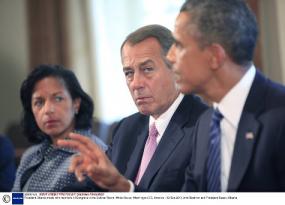
Tensions were high this week as the United States came ever so close to economic disaster. The American government nearly breached its $16.7trn debt limit, facing the very real possibility of defaulting on its payments unless a new budget could be reached or the debt ceiling raised. Although politicians made a temporary deal at the last minute the same difficulty will have to be resolved in next year. Come 2014, the same budget fighting will commence all over again.
A US default wouldn’t just cripple the US economy. As the British economy is just now creeping out of its recession, any sort of upset on a global level would push the country back into an economic decline, with devastating effects. Kingston, in particular, would be a hard hit area. The local economy consists predominantly of retail shops, pubs, and restaurants. When a recession hits and expendable income becomes tight, these are among the first expenditures to go. The local economy is delicate enough as it is, and thus another economic crisis would be more than enough to push the UK over the edge back into a full-swing recession.
The massive deficit that the US has incurred boils down to the simple fact that the government spends much more money than it takes in. The Democrats believe that to close this gap taxes must be raised, especially on those with an annual income of over $250,000. Republicans, on the other hand, think that both taxes and government spending must be cut to put the government on a less fierce debt trajectory.
The worse the debt crisis gets, the higher the stakes become. With around $500bn worth being exchanged on a daily basis, American government bonds are heavily depended upon as a safe and common asset in the world markets. Not only Americans, but investors from all over the world hold these government bonds, including many in the UK. The longer a permanent solution is delayed, the more the US will be viewed as an unstable block in the global economy. If this political disfunction continues, the more the world markets will become uneasy. This will lead to decreased willingness to lend money, unless at terribly high interest rates, and thus an eventual spiral back into a global recession. London, with its heavy reliance on financial industry would be one of the first to feel the ramifications of another economic disaster.
Both the Democrats and the Republicans need to realise that this fiscal crisis cannot be viewed as a partisan war against parties, but simply as a completely solvable math problem. Compromising need not be seen as a weakness, but as an essential part of the negotiation process. Neither side may get entirely what they want, and the pain may have to be spread around a little. But if this can lead to a long term practical solution to ongoing fiscal problems, then so be it. Both parties need to put their party politics behind them for the sake of the American people, and the global economy as a whole. Crisis has been averted, for now.




